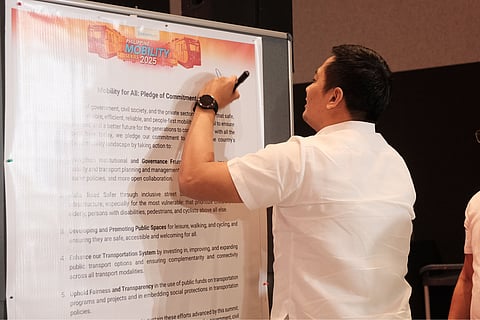
- NEWS
- the EDIT
- COMMENTARY
- BUSINESS
- LIFE
- SHOW
- ACTION
- GLOBAL GOALS
- SNAPS
- DYARYO TIRADA
- MORE

Stakeholders urged the national government to increase public participation in co-designing transportation systems and urban spaces, amid nationwide calls for improved road safety and accessibility.
The push came during the inaugural “Philippine Mobility Summit 2025,” where advocates from academia, civil society, non-government organizations, and the private sector sought a commitment from government transport agencies. The groups want to work with officials toward a “safe, inclusive, sustainable, efficient, reliable, and people-first mobility” system.
The summit, presented by AltMobility PH and co-presented by the Department of Transportation (DoTr), was held last 15 September at One Ayala in Makati City.
It was the culmination of the "Philippine Mobility Series," which from April to August discussed road safety, inclusive public spaces, low-cost mass transit, and transport transformation.
During the summit, stakeholders and officials -- including DoTr Undersecretary for Road Transport and Infrastructure Mark Steven Pastor, Land Transportation Franchising and Regulatory Board (LTFRB) director Joel Bolano, and Quezon City Assistant Administrator Alberto Kimpo -- signed the “Mobility for All: Pledge of Commitment.”
The commitment outlines five key points. It calls for strengthening institutional frameworks for transport planning, creating safer roads with inclusive street design that prioritizes vulnerable users like children and people with disabilities, and developing public spaces for walking and cycling.
The pledge also aims to enhance public transportation by investing in new options and ensuring connectivity, while upholding fairness and transparency in how public funds are used for transportation projects.
Booey Bonifacio of Grab Philippines called the summit a “timely and pivotal gathering.”
“The output of this summit is groundbreaking because it promotes a co-development framework, which means people’s involvement in the crafting and designing of the government’s transportation and mobility plans -- providing not only alignment but also accountability,” she said.
